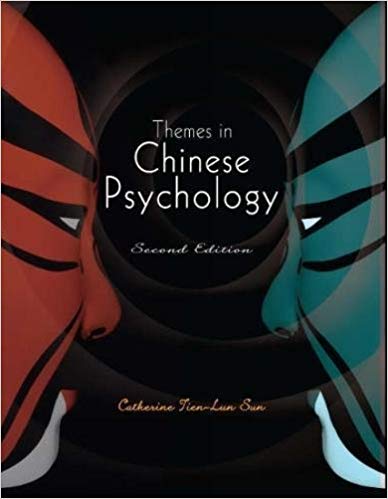Test Bank For Themes in Chinese Psychology 2nd edition by Catherine Tien
Digital item No Waiting Time Instant DownloadISBN-10:9814416614 ISBN-13:978-9814416610
In Stock
Original price was: $55.00.$24.00Current price is: $24.00.
Test Bank For Themes in Chinese Psychology 2nd edition by Catherine Tien
CHAPTER 2: TAOISM AND CHINESE PSYCHOLOGY Multiple Choice Questions with Answers1. According to Taoism, human beings should cherish their relationships with Nature, and maintain harmony bya. following the Taob. protecting the environmentc. understanding Nature d. all of the aboveAnswer: a2. Tao
- is just a concept and need not to be lived and experienced
- is in line with human nature.
- entails dominating and controlling
- is the way of Nature
Answer: d3. The Taoist concept of Wu Wei refers to
- inactivity
- no action
- not acting in contradiction to Nature
- not acting inappropriately
Answer: c4. The typical Taoist is
- Passive
- Receptive
- Observant
- Reluctant to change
Answer: c5. Which of the following is not Five Elements in Taoism?
- Wood
- Earth
- Fire
- Soil
Answer: d6. Which of the following is not one of the Three Treasures in Taoism? a. Hard‐workingb. Compassion and kindness
c. Not daring to be the first d. EconomyAnswer: a7. Tao Te ChingTao
- contains the teachings of Lao Tzu
- contains the teachings of Chuang Tzu
- contains the teachings of Confucius
- contains the teachings of Mencius
Answer: a8. The Classics of Nan Hua 南華經
- contains the teachings of Mencius
- contains the teachings of Confucius
- contains the teachings of Chuang Tzu
- contains the teachings of Lao Tzu
Answer: c9. Which of the following is not one of the five attitudes of Taoism which can be incorporated into the practice of counseling?
- respecting Nature’s rhythm
- maintain peace of mind
- be self aware
- none of the above
Answer: d10. Taoism emphasizes
- the pursuit of personal happiness
- the pursuit of society harmony
- the pursuit of universal happiness
- the pursuit of universal harmony
Answer: d11. In applying the Taoist concept of the Taoist concept of “The Named” in psychotherapy, we realize that the importance of words is thata. when we find the right words to describe our state of mind, a paradigm shift may occurb. when used correctly, they facilitate accurate diagnosisc. they bring to consciousness awareness what is hidden in the preconscious or unconsciousd. they are instrumental in achieving catharsis
Test Bank for Themes in Chinese Psychology, 2nd Edition by Catherine Tien
Overview: The Test Bank for Themes in Chinese Psychology, 2nd Edition by Catherine Tien is a comprehensive resource designed to accompany the textbook, providing educators with a range of tools to assess students’ understanding of Chinese psychological concepts, theories, and practices. This edition delves into the unique psychological themes prevalent in Chinese culture, offering insights into how traditional Chinese thought influences modern psychological practices.
Content:
- Multiple Choice Questions: These questions test students’ knowledge of key concepts, theories, and cultural influences discussed in the textbook. The multiple-choice format provides a straightforward way to assess students’ retention of the material.
- True/False Questions: This section helps students distinguish between accurate information and common misconceptions related to Chinese psychological themes. It covers essential ideas and theories presented in the book.
- Short Answer Questions: These questions encourage students to provide concise responses, demonstrating their understanding of specific aspects of Chinese psychology, such as the impact of Confucianism, Taoism, and Buddhism on psychological practices.
- Essay Questions: The essay section invites students to engage in deeper analysis, often requiring them to explore the relationship between Chinese culture and psychology, compare Chinese psychological practices with Western approaches, or discuss the implications of traditional Chinese beliefs in contemporary settings.
- Case Study and Application-Based Questions: This section includes scenarios where students must apply their knowledge to real-world situations, particularly within the context of Chinese society. It assesses their ability to integrate cultural understanding with psychological practice.
Key Features:
- Cultural Context: The test bank emphasizes the importance of cultural context in understanding psychological themes, ensuring that students grasp how Chinese traditions influence psychological thought and practice.
- Variety of Question Types: With multiple types of questions, including multiple-choice, true/false, short answer, and essay, the test bank caters to diverse learning and assessment needs, allowing educators to test students comprehensively.
- Alignment with Textbook: The questions are closely aligned with the content of the 2nd edition, covering all major themes and ensuring that students are tested on relevant material.
- Critical Thinking and Application: The test bank not only assesses knowledge but also encourages critical thinking, particularly through essay and application-based questions, which require students to apply their understanding in practical and culturally relevant ways.
Conclusion:
The Test Bank for Themes in Chinese Psychology, 2nd Edition by Catherine Tien is an essential tool for educators teaching Chinese psychology or related courses. It provides a broad range of assessment options that challenge students to think critically about the material, understand the cultural context, and apply their knowledge in meaningful ways. This test bank ensures that students are well-prepared to engage with the complex and rich psychological traditions within Chinese culture.


Reviews
There are no reviews yet.